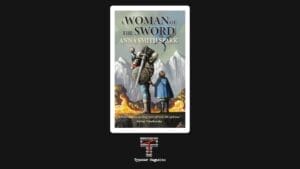By Julian Williams
The Space Between Worlds by Micaiah Johnson is a brutally direct and efficient piece of speculative science fiction. The novel takes place in a far future where the Eldridge Institute, headed by the thinly-veiled Musk stand in Adam Bosch, has created technology to visit alternate universes. And due to a collapsing climate and thin resources, they utilize this technology for dimensional extraction.
Everyone has at least once thought to themselves, “If only things had worked out differently, my life would be better.” Cara, the book’s protagonist, is uniquely positioned to see those other strands of fate as a universe-jumper working for Eldridge. Would she truly be happier if she was in another life? Or would she be miserable no matter the circumstances since, in the end, she would still be herself? How much of her position is circumstance and survival, and how much of it is her choice to remain truly alone? These are the questions at the heart of Space Between Worlds. And when Johnson is done answering them, the story is over.
When I looked up reception to this book, I found people confused and frustrated that we see so little of the alternate realities. We see peeks at other versions of characters, but Johnson spends little time with these alternate portrayals or in weirder realities. I found the criticism genuinely bewildering. Space Between Worlds is not Star Trek, nor is it Rick and Morty. The title tells the reader what the book is about – the space between worlds.
Cara is a brown woman from the poverty riddled Ashtown, with an immediate family full of drug addicts, abusers, and criminals. Her brother is mulling over joining an organized gang; some relatives are even dead. Life is hard in Ashtown and everyone she knows lives on a knife’s edge. In many of the other realities, Cara did not survive. She comes from a tough reality, and she is not comfortable in the glitzy tech utopia of Wiley City, or the squeaky-clean corporation she works at, or all the beautiful pale-faced people who are her colleagues – because this is not her world. None of this is.
Space Between Worlds is a novel about how a person’s upbringing shapes who they are, and about the shared fear, mistrust, and isolation at the heart of being such a human. But imagine how much better it would’ve been if, instead of exploring the depths of psychological makeup of the cast, Cara instead explored alternate dimensions where humans are wasp-people, or maybe gazorpazorps. Pages and pages wasted on indulgent frivolity.
This audience desire to drift from the story we’re engaging with and fixate on irrelevant details speaks to a rot that I’m deeply frustrated by as a fan of science fiction and fantasy in the current era. We are awash in the multiverse, fictional histories, and layers and layers of Lore.
A new show debuts and debates about canon or retcons drown out other forms of analysis. Turn over a rock that says ‘Star Wars’ and you’ll see a hive of complaints about the way hyperspace routes function, the inefficacy of Jedi training, or a half-second cameo from an obscure character. Case in point, the new Fallout series dropped on Prime Video in April. Within hours, a deluge of nitpicks about the show’s seeming erasure of the Fallout: New Vegas video game canon flooded social media.
It’s easy to laugh at the backlash, and even write it off as a bunch of angry nerds with nothing else to gripe about. But this pattern of behavior – the mutated relationship between reader and writer – deserves to be taken seriously by anyone passionate about the fate of art.
We’re far from the time when nerd outrage over the trivial was contained to The Mary Sue comments section or a lightly-trafficked message board on the ass-end of the world wide web. This is the way people engage with media.
In contemporary culture, social media sentiments from the loudest voices fuel how stories are told. As Annalee Newitz wrote in The New York Times in 2021, online fandom is “a force that seeks control over everything, from characters’ romantic choices to producers’ casting decisions.” Reception on social media, YouTube, Reddit, and other internet locales shapes the way people read a text. And if there’s one thing these communities love, it’s poring over obscure facts and trivia. And if there’s one thing intellectual property holders love, it’s passing off obscure facts and trivia as deep, masterfully told lore.
Small messages travel easier, and as such, lore has ballooned in importance. Analyzing the themes and character struggles is dense and messy. It’s much simpler to explain minutiae that exists in the proximity, and when you apply that to YouTube, that means much quicker output of the all-important Content. Rather than talking about Andor’s depictions of imperialism, political will, and armed resistance, fans look at the Kyber crystal Luthien gives Cassian as a payment and theorize what it means. Is Luthien a Jedi? Who’s saber did this come from?
This is the damage a fixation on lore does. We focus on the wrong things.
Once, lore was the accessory to story. It was jewelry you hung off your fiction, bringing out the color and vibrancy of your world by creating contrast. As your heroes struggle and the world resists their efforts, lore becomes the reality they must fight. Batman, after all, is nothing without a rogue’s gallery and a Gotham too crime riddled for public action.
But now lore has become a lead blanket that suffocates creativity in a fruitless pursuit of a kind of objective ‘quality’ – reducing the scope of imagination and fiction to a collection of lego pieces that must fit together perfectly. Lore turns stories that are meant to speak to emotional truths and excite our senses into a list of boxes to check. Instead of wondering where a story is going, filling us with tension and curiosity, lore turns fiction into homework for creatives and consumers alike.
On a recent episode of the podcast Rite Gud, they did an entire dive into this exact issue titled Against Worldbuilding. I’d highly recommend listening (or reading) the whole thing, as they echo much of the thoughts I’ve written here. If you’d believe it, I had written this entire piece before their episode dropped.
But one thing R. S. Benedict said stuck out to me;
There’s that principle about a wheel [that] might be made of 30 spokes, but it’s the emptiness in the middle that makes the wheel useful. Everything turns around this hole in the middle. If this wheel didn’t have this hole in the center, you’d have nowhere to put your axle; it wouldn’t spin around anything, right? So when you’re creating a world, you want to leave space for the…reader to go into.
Echoing this further, lore has so fully consumed the reader’s mind that now nothing can be the negative space. We are attaching spokes, one by one, to every part of a story’s wheel, until there is no more space left and we are staring at a non-functioning tire.
Star Wars, similar to The Hobbit, was never intended to create a sprawling space opera, let alone a franchise. Lucas had a fun idea in mind for a Commando Cody serial throwback, with a sprinkling of Kurosawa on the brain and some thoughts on imperialism. It’s only after three movies, a couple dozen novels, and a hundred billion toys do we arrive at an Expanded Universe proper.
Before all of that, there was no “Doctor Cornelius Evazan.” He was just some jerkoff that threatens Luke in the bar – a minor character placed in the story so you know Ben Kenobi is as strong as he is wise. Only after the world must fit into canon do we spiral forever down the abyss of continuity, where a movie cannot make you feel things, it can only disrupt or support canon.
We are in the era of the fan wiki and the lore YouTuber. That means every story can’t simply exist as a piece of media. It must be more than that, it must stretch into the infinite so it can become a flood of profitable, unchallenging content, a Cinematic Universe of its own. The complete story must exist in the Matrix movie sequels, the video game, the comic book, and the lunchbox. Lore feeds the capitalist beast, and it’s time writers stop putting coins into that machine.
Audiences claim they like a lot of lore, but I think this is a misunderstanding of what ‘lore’ truly means to the audience. A Song of Ice and Fire is dense with world history, but all of it exists to create context and meaning for the characters and their actions. Torrhen Stark, The King Who Knelt, is a fascinating figure in the universe, but his actual use in the story is to draw contrast to the act of fruitless rebellion in the face of annihilation.
Daenerys is conquering with an army seen only once before, when Aegon Targaryen the First did the same. All dynasties who claimed independence from him fought valiantly to the end, and are no more to this day. Torrhen Stark stands as a figure who saw the writing on the wall and saved a lot of lives putting aside his ego, as a reminder of the path left open to those who could do the same. He is not simply ‘a guy who did some cool stuff a long time ago.’ Your history must apply to the present as an echo, not simply exist as tertiary micro stories.
And, circling back to what R. S. Benedict said earlier, it cannot be comprised entirely of spokes. We know only scant details about Torrhen aside from this. We are not given a conclusive record about the process to which he made his decision and the crown he surrendered is not sold as a piece of merchandise. It is merely one spoke standing alone, surrounded in emptiness.
Space Between Worlds does an outstanding job entwining the metaphorical with the literal. Cara is out of place at her work because she comes from a much harder life. When she jumps into the other dimensions, that metaphor keeps coming to the forefront, asking her again, Who are you, Cara? Are you your ex-boyfriend’s damage? Are you a survivor? Are you a bad person? What choices have you made that brought you here? The story is there, in her personal struggle for self. It is not in finding a reality where humans are all bipedal turtles.
Clean, glitzy Wiley City and Mad Max-inspired slum Ashtown represent class struggles and the dissonance of trying to escape one to the other. Those are the worlds that matter, and by focusing solely on that, Micaiah Johnson shows us all how classic science fiction can be done right, in the vein of Black Mirror. Just a little piece of super science, a little human drama, and a tight focus.
A vast, wondrously woven fictional world absolutely speaks to an author’s skill. You only have to say the word ‘Tolkien’ to evoke thoughts of Middle Earth’s Rohan or Gondor or the tale of the forging of the Rings. But I think in a rush to become like Tolkien, or George R. R. Martin, or Ian M. Banks, many writers tend to lose themselves building out lore. But even Tolkien didn’t become a lore magician from the starting line. The Hobbit was written as a stand alone children’s book. Only when Tokein had the space to write a sequel did he spend those long years creating the Middle-Earth we know and love. To misquote Blood Meridian, ‘before the world was, story awaited it.’
In The Space Between Worlds, Micaiah Johnson keeps lore properly in check. It would’ve been so easy to let it overwhelm the novel, with Cara visiting endless universes. Instead, Johnson resists the bait. She focuses on story and character rather than sidetracking both with jaunts to new locations. Some readers did not respect this choice. But why do they react so negatively? What is truly gained by adding these extra locations and pissing about in them? Does The Dead Past truly need expanded chapters explaining how neutrinos work, and the application to other disciplines? Or is Asimov trying to tell us something about the way technology intersects with human desires? To expand upon Space Between World’s other realities would be turning the story into a vehicle for other things – other stories, yes, but also other capitalist enterprises. Merch, toys, et al.
In this way, lore pollutes the stories that tell us about ourselves. I suggest we learn from Micaiah Johnson’s example, and stop trying to make stories about place more than people.
Julian Williams is a writer and critic who posts at (https://bsky.app/profile/




